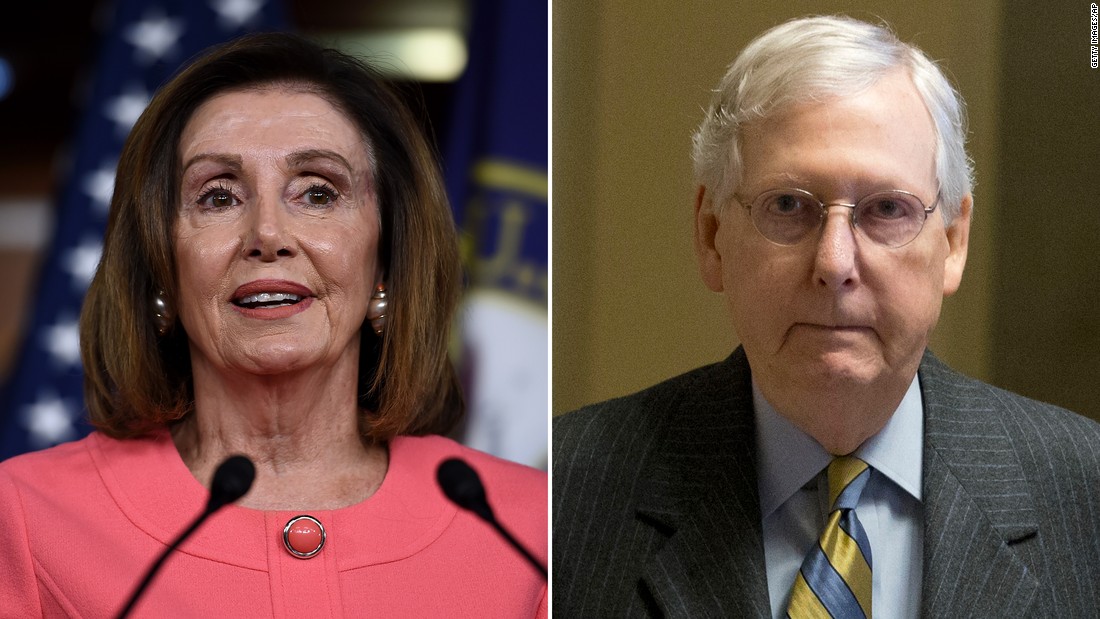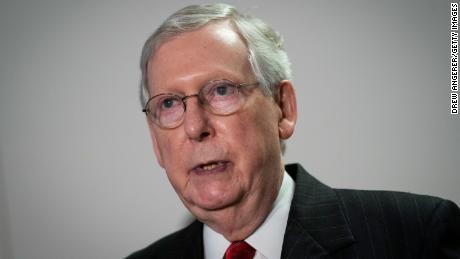Stimulus negotiations: 3 routes to Covid relief all face fierce headwinds
Reality check: it’s not.
There are basically three separate attempts happening right now on Covid relief and all of them — at least at this point– are a long shot.
These talks between Republican Sens. Lisa Murkowski, Susan Collins, Bill Cassidy and Mitt Romney alongside Democratic Sens. Joe Manchin, Mark Warner and Jeanne Shaheen and Angus King, an independent who caucuses with the Democrats, have been going on for weeks and were born out of a frustration that nothing was getting done.
The inaugural in-person meeting — a dinner hosted by Warner and Collins at Murkowski’s house — morphed into what became almost daily meetings, constant calls and weekend zooms, according to a person familiar.
The point is this exact framework was never intended to become law and there are tons of missing details here. The goal was simply to jumpstart committee-level talks and get leadership engaged again. Both Warner and Romney were keeping Treasury Secretary Steven Mnuchin in the loop, but the White House hasn’t signed off. In fact, they have concerns about the amount of state and local funding outlined.
And, while Senate Democratic Whip Dick Durbin of Illinois has been engaged, he too has cheered the group on all while arguing they need more detail before he could sign off.
McConnell’s plan
“We don’t have time for messaging games, we don’t have time for lengthy negotiations,” McConnell said announcing he was going to be taking the temperature of his conference over the next several days.
He continued: “The issue is: we want to get a result and I like to remind everybody that the way you get a result is you have to have a presidential signature. So I felt the first thing we needed to do was to find out what the President would in fact sign. We believe we’ve got the answer to that. We’re vetting that on our side and then we’ll let you know later whether we think there’s any way forward.”
Mnuchin told reporters Wednesday while walking into a House hearing that President Donald Trump would sign the package that McConnell has floated. “The President will sign the McConnell proposal that he put forward yesterday, and we look forward to making progress on that,” Mnuchin said.
McConnell’s plan includes:
- broad liability protections
- one month extension of unemployment benefits for gig workers
- one month extension of unemployment expansion from 26 to 39 weeks
- another round of Paycheck Protection Program money for businesses that demonstrate a 25% loss
- loan forgiveness for the Post Office if their cash balance drops below a certain point
- short-term assistance for childcare providers
- $105 billion for school funding for K-12 and college
- $16 billion for testing
- $31 billion for vaccines
- extends the time state and local governments have to use their Covid relief funding from the end of December to September 2021.
The Democratic leadership offer to McConnell
While substantive discussions between House Speaker Nancy Pelosi, Senate Democratic Leader Chuck Schumer, McConnell and McCarthy haven’t occurred still, Democrats did quietly send an offer to Republican leaders Monday evening. The proposal was a non-starter in part because it didn’t include the language on liability protections, a red line for McConnell. The existence of the offer became public after McConnell alluded to it during his press conference.
In many ways, negotiations between McConnell and Pelosi would be the most promising if they could ever get off the ground. But they have never really started. That’s not to say there is no communication. According to one source familiar with their communication McConnell talked to Majority Whip Steny Hoyer Monday on another topic when the stimulus came up. But this is why despite the amount of activity yesterday, substantively little has changed.
That can always change very quickly.
Still, lawmakers are still dealing with three major sticking points:
- How to structure state and local funding
- liability protections
- price tag
National Defense Authorization Act
It’s a huge deal because for 59 straight years the NDAA, the bill that sets policy for the Pentagon, has been bipartisan. And this fight Trump is about to wage, is going to threaten that.
It’s hard to overstate right now how upset many conservatives are with tech companies like Twitter and Facebook and how much pressure some usually business friendly Republicans could come under if they cross Trump here. There is frustration about how their personal content is being fact checked in real time. A fight over Section 230 could force Republicans to choose between Trump and the Pentagon.
Some GOP lawmakers are speaking out against the threat to veto the NDAA, siding with the Defense Department.
A note about the calendar
Lawmakers are slated to head home after the spending bill passes as soon as next week, but that could get complicated. There are a growing number of Democrats and Republicans who believe it would be unconscionable to leave without doing something on stimulus.
Sen. Tim Kaine, a Democrat from Virginia, has been telling members he may object to adjourning for the holiday if there is no stimulus deal. He can’t stop recess all together. This is symbolic because leadership usually likes to avoid a roll call vote on this given the message it would send of members voted “yes” to leave Washington as millions were set to lose their unemployment benefits or protection from evictions.
One negotiation that is still moving forward (but hitting some snags)
The omnibus negotiations have been progressing. But, some aides involved in the talks tell CNN that time is running short and there is a legitimate fear that lawmakers might have to turn to a continuing resolution to fund the government if the pace doesn’t pick up soon.
There are some issues — including the structuring of the VA Mission Act funding — that continue to slow progress. VA Mission Act was passed to provide broader health care options to veterans. But, the costs have continued to be a sticking point over the years because many lawmakers believe the $12.5 billion price tag is easier to deal with if it lives outside the budget caps that were set in 2019. Fiscal conservatives disagree.
It’s one reason you saw Mnuchin and Pelosi have a call on Tuesday. The way they are dealing with the VA Mission Act right now is to declare it as emergency spending. That’s a fancy way to say that it’s allowed to live outside the budget caps. McCarthy has argued, however, that doing that breaks the spirit of the 2019 caps agreement. Senate Appropriations Chairman Richard Shelby, an Alabama Republican, disagreed and already signed off along with his Democratic counterpart in the House Nita Lowey of New York. But McCarthy — and to some extent Mnuchin — have fought it.
Other issues that have come up in the omnibus negotiations are the number of detention beds in immigration facilities as well as how much money will be allowed to fund Trump’s border wall. In some ways, those issues are more symbolic than substantive. We all know that President-elect Joe Biden doesn’t plan to build a wall even if there is money for it. But, the symbol is real and the fight is real in every single one of these negotiations.
The sticking points are not insurmountable at this point, but time is running short. Aides believe that they need to close out many of these items by the end of the weekend or they will need to move to a continuing resolution, short-handed around Capitol Hill as a CR, which continues funding at current levels for a set time.
This story has been updated with additional developments Wednesday.
CNN’s Kristin Wilson contributed to this report.
![]()








